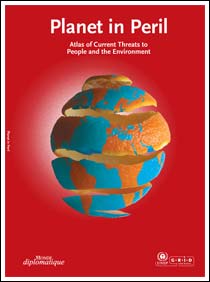 Planet in Peril: Atlas of Current Threats to People and the Environment
Planet in Peril: Atlas of Current Threats to People and the EnvironmentPlanet in Peril: Atlas of Current Threats to People and the Environment is the English translation of Le Monde diplomatique’s recently published Atlas 2006. It is the result of a long-standing cooperation between Le Monde diplomatique and GRID-Arendal (1).
These pages offer a holistic and well-researched analysis of today’s global issues and their impact on human population and the environment.
Written by an international team of specialists, these pages from the Atlas illustrate through text and maps, graphics and diagrams the interplay between population and the world’s ecosystems and natural resources both in the short and long terms. It brings together a wealth of information from the most up-to-date sources on such key issues as climate change, access to water, exploitation of ocean resources, nuclear energy and waste, renewable energy, weapons of mass destruction, causes of industrial accidents, waste, export, hunger, genetically modified organisms, urban development, access to health care and ecological change in China.
With its expansive scope, richly detailed information, and inviting design, the Atlas is an indispensable resource for understanding the planet we live in.
Polar ice caps melting faster
Global warming is not affecting the planet evenly and most of the existing models forecast that it will be greater in the northern hemisphere. With an overall increase of 2°C, temperatures in the Arctic could increase by a factor of two or three. The southern hemisphere, would also be affected, though less severely.
Polar ice caps melting faster
The Kyoto protocol came into force on 16 February 2005, heralding the advent of a more mature attitude. Mankind, we were told, had finally woken up to the increasing pressure that it is exerting on the environment. Unfortunately a closer look shows that such claims have more to do with wishful thinking than actual fact.
Water becoming a rarity
Despite the international community’s commitments many people still do not enjoy the right of access to clean water and half the world’s population is in danger of running short of this vital commodity in 30 years.
Ocean resources under threatThe planet’s one ocean - for the various oceans form a single ecosystem - covers 361m square kilometres, or 71% of the Earth’s surface. Exploitation of renewable and non-renewable resources has steadily increased. Some renewable resources are the focus of keen rivalry. No sooner do we realise their potential than they threatened by over-exploitation.
Nuclear power for civilian and military use
Nuclear power only makes a minor contribution to world energy consumption. Given the average age (about 22 years) of the nuclear reactors still in service and nuclear power stations’ limited share (barely 2%) of the market for new electricity production facilities, the situation is unlikely to change in the immediate future. In the meantime there is still no solution to the problem of nuclear waste and the risk of proliferation.
Renewable energy, fact and fiction
Renewable energy technologies have made considerable progress. Windmills and solar panels, modern wood-burning boilers, biofuels, bioclimatic buildings are all widely available, often at competitive prices.
Weapons for rich ... and poorWeapons of mass destruction (WMD) have only one thing in common, their potential for killing large numbers of people. The term covers nuclear, chemical and biological weapons, as well as ballistic missiles, their main vector. On the sidelines dirty bombs belong to the arsenal of terrorism.
Who causes industrial accidents?The Johannesburg summit in 2002 emphasised the part that business would have to play in achieving sustainable development. But in many cases we are still waiting for tangible results, with large firms taking advantage of the laxity of national governments.
Waste, recyclers and recycled
Promoting growth based on intensive productivity and consumption has major disadvantages, one of the most serious being the huge volume of waste produced and the problem of its disposal. Statistics fail to convey the full measure of the problem, particularly for industrial waste, now a commodity for international trade transported long distances around the world.
The South depends on its exports
Since the 1970s the price of raw materials has followed a downward trend, subject to great instability. But developing countries, heavily in debt and dependent on their exports, are increasingly reluctant to bow to the demands of rich countries, as the failure of the Cancun negotiations demonstrated.
Losing the battle against hungerIn 2000 there were 852 million undernourished people on Earth. Over the last five years their number has increased every year by about 4 million. Without a radical change of course we will not achieve the United Nations Millennium Development Goal (of reducing by half the proportion of people suffering from hunger by 2015). The reasons for this failure are all too familiar.
GM organisms, too much, too soonThe issue of genetically modified organisms draws together strands from the debate on the global market and the concept of progress. It is a perfect illustration of how market forces come into play much more quickly than the precautions that seem appropriate given the current state of research. We are consequently already eating genetically engineered foodstuffs without it being possible to guarantee they are entirely safe.
GM organisms, too much, too soon<
GM organisms, too much, too soon
Urban development trends
Urban culture, with its values, fads and fashions, now governs the entire planet. But from one continent to the next the form and pace of urban development vary, even if motor vehicles and their attendant infrastructure are omnipresent.
Widening health care gapUnequal access to health care is the cruellest, most widespread attack on human integrity. Coming on top of longstanding differences in standards of living, the balance of power that lets North dominate South inflicts chronic bad health on whole countries, sapping any attempt at development.
China a key factor in tomorrow’s climateChina is fast becoming the workshop of the 21st century world. But a shortage of raw materials abroad and increasingly serious environmental problems at home are already threatening continued growth.







